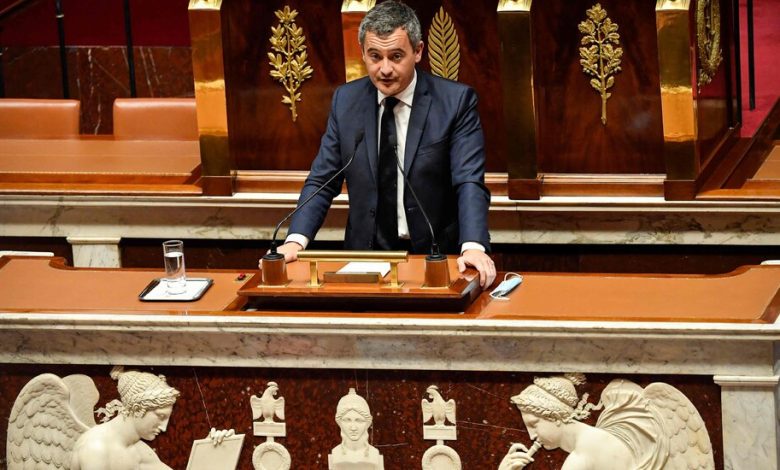Macron’s Plan on Migrants: Deport More, Give Others Legal Status

PARIS — The issue of immigration once again took center stage in French politics on Tuesday, as President Emmanuel Macron proposed a tougher stance on deportations, while also extending work opportunities for migrants with needed skills.
Mr. Macron’s government is trying to balance pressure from a rising far right to get immigration under control, against France’s need for immigrant labor. Its bill reflects his long-stated willingness to streamline both admissions and deportations, fulfilling a promise he made during his re-election campaign earlier this year.
Recent incidents — including a schoolgirl’s killing by an illegal migrant and the disputed docking of a migrant rescue vessel — have also pushed the government to try to take the heat out of a combustible issue.
Immigration has long been a fixation of politics in France — the president’s proposal would be the country’s 29th immigration and asylum law in four decades — where politicians and commentators, particularly on the right, often describe a country fending off an out-of-control influx of migrants. In reality, France has a smaller proportion of immigrants in its population than most of its neighbors, and in the past decade, immigration has grown less there than in the rest of Europe.
For four hours on Tuesday, lawmakers debated Mr. Macron’s balancing-act plan, which is expected to come to a vote next spring. The government is hoping to win the votes of opposition members on the left and right, which it needs to pass the bill, after the president’s party lost its absolute majority in the National Assembly.
“It is legitimate to raise the question of our migration policy: to say who we want, who we can welcome, and who we don’t want, who we can’t welcome,” Prime Minister Élisabeth Borne told the National Assembly, the lower and more powerful house of Parliament.
The main goal of the bill is to streamline the country’s sluggish deportation process. Over the past decade, only about 15 percent of migrants ordered to leave actually departed the country, according to a Senate report released in May.
Under the proposal, the number of possible appeals for rejected asylum seekers would be reduced to four from 12; deportation procedures would be sped up; and some safeguards for foreigners would be removed to make it easier to expel them if they were convicted of crimes.
“We must be able to take in more quickly those who deserve asylum, and refuse more quickly those who cannot obtain it on our soil,” Gérald Darmanin, Mr. Macron’s hard-line interior minister, said on Tuesday.
A collective of aid groups, including Amnesty International, denounced in a statement what they saw as measures that “risk further eroding the rights of foreigners,” such as the rights to asylum and to a fair trial, and may result in “the worsening of the precariousness” of asylum seekers.
That insecurity has played out for several days in central Paris, near the Louvre museum, where dozens of young migrants have set up tents in the freezing cold to demand that they be recognized as unaccompanied minors and be offered asylum.
François Héran, a leading expert on migration who teaches at Collège de France, said France delivered “far too many removal orders,” more than it can enforce, including to migrants who are working and well integrated.
According to the Senate report, the number of orders issued doubled in the past decade, reaching 122,000 in 2019, the same level as “Greece, Spain, and Italy combined, which face at least comparable migration pressure.”
Mr. Héran added that the law illustrated what he says is France’s refusal to accept that rising immigration is now a global phenomenon affecting all Western countries. “The current debate is totally out of step with the reality,” he said.
In an effort to balance tighter admission rules with better settlement conditions, the government also announced that it planned to create renewable one-year residence permits for undocumented migrants who are already in France and want to work in sectors suffering staffing shortages, such as catering.
“Immigration has always enabled France to respond to the needs of its economy,” Olivier Dussopt, the country’s labor minister, said.
But that proposal has come under fire from the center-right Les Républicains opposition party, which holds the key to a potential majority on the bill and with which the government has hoped to build a coalition in Parliament.
“When it comes to immigration, there can be no ‘at the same time,’” said Pierre-Henri Dumont, a member of Les Républicains, in a nod to the catchphrase Mr. Macron has long used to signal his bipartisanship. “If you maintain your willingness to regularize illegal immigrants on a massive scale, we will vote against all of your entire future bill.”
Lawmakers on the left also voiced sharp criticism of the government’s bill, denouncing what they called a repressive stance that is out of step with growing migration flows around the world because of wars and climate change.
In 2018, Mr. Macron’s government passed a law meant to tighten immigration, and which resulted from two pressing realities that remain today: a growing number of asylum seekers and increasing pressure from the far right.
Last month, Britain and France signed a new agreement to stem the growing number of small boats carrying migrants across the English Channel. The deal came nearly a year after 27 people died in a failed attempt to cross the busy waterway, one of the deadliest accidents in the channel in modern memory.